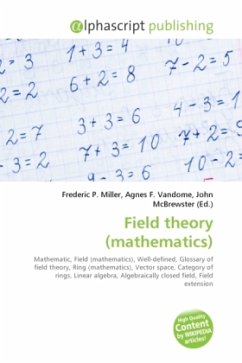
Estimation Theory
Versandkostenfrei!
Versandfertig in 6-10 Tagen
26,99 €
inkl. MwSt.

PAYBACK Punkte
13 °P sammeln!
Estimation theory is a branch of statistics and signal processing that deals with estimating the values of parameters based on measured/empirical data. The parameters describe an underlying physical setting in such a way that the value of the parameters affects the distribution of the measured data. An estimator attempts to approximate the unknown parameters using the measurements. For example, it is desired to estimate the proportion of a population of voters who will vote for a particular candidate. That proportion is the unobservable parameter; the estimate is based on a small random sample...
Estimation theory is a branch of statistics and signal processing that deals with estimating the values of parameters based on measured/empirical data. The parameters describe an underlying physical setting in such a way that the value of the parameters affects the distribution of the measured data. An estimator attempts to approximate the unknown parameters using the measurements. For example, it is desired to estimate the proportion of a population of voters who will vote for a particular candidate. That proportion is the unobservable parameter; the estimate is based on a small random sample of voters. Or, for example, in radar the goal is to estimate the location of objects (airplanes, boats, etc.) by analyzing the received echo and a possible question to be posed is "where are the airplanes?" To answer where the airplanes are, it is necessary to estimate the distance the airplanes are at from the radar station, which can provide an absolute location if the absolute location of the radar station is known.












